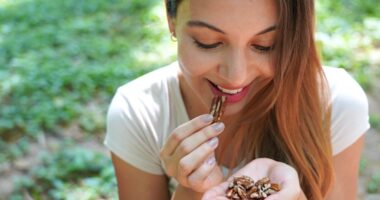Judging by the lacklustre autumnal weather, summer is now officially over – and with it goes the natural boost it gives to our health.
Britons get most of their vitamin D – a nutrient produced by exposure to sunlight crucial for bone and muscle health, and which also has an impact on energy levels – between March and September.
Pleasant weather encourages people to get outside and exercise. And autumn heralds the arrival of the coughs and colds season.
Research also shows that cold and wet weather lowers our mood.
Thankfully, it’s not all bad news. Experts say there are simple steps people can take to replicate that feel-good summer boost – even if the nights are drawing in.

Britons get most of their vitamin D health boost between March and September when the weather is brighter, but there are still simple ways to stay in shape as temperatures drop

People singing in a choir. Research shows joining a choir can release ‘feel good’ endorphins which increase happiness and wellbeing
Join a choir (or go see some comedy) to fight the winter blues
One in five Britons experiences low mood during autumn and winter – a phenomenon known as seasonal affective disorder (SAD) which also leads to a dip in energy levels.
The cause is not fully understood. But research suggests a lack of sunlight might lead to lower levels of the hormone serotonin, which is linked to mood and sleep and may trigger depression.
Some sufferers are offered antidepressants, but experts say they are not always necessary.
In fact, research suggests joining a choir can release ‘feel good’ endorphins – chemicals which help relieve pain or stress – which increase happiness and overall wellbeing.
One Italian study found older people who sang in a group every week saw their levels of anxiety and depression cut significantly within just three months.
‘Singing is such a positive thing for your mental health,’ says Dr Nisa Aslam, a Watford GP. ‘Not only does it give you a mood boost, it also provides older people with the chance to interact with others, which is so crucial at that age.’
Alternatively, watching stand-up comedy with friends can also boost your mood, one Finnish study has found.
Get separate duvets to give your immune system a timely boost
It’s a debate all couples will be familiar with: is the bed too hot?
Research suggests women are more sensitive to temperature changes in the bedroom than men.
One US survey found nearly a fifth of women report feeling too hot when trying to sleep, compared to just a tenth of men.
This can significantly affect sleep quality which, in turn, weakens the immune system and raises the risk of winter bugs, according to a sleep medicine expert at the University of Oxford.

Sleep quality affects the immune system and the risk of winter bugs, a sleep medicine expert has said
Professor Colin Espie says sleep plays a ‘crucial role’ in infection control, adding: ‘Good sleep promotes the distribution of immune cells (lymphocytes), and the production of protective cells (cytokines).’
Experts recommend that couples get separate duvets that will cater to their individual needs.
‘Some people need a 4.5 tog duvet all year round, while others need a warmer 13.5 tog,’ says behavioural sleep expert James Wilson, known as The Sleep Geek.
‘It only takes a change in your core temperature of about 0.5 degrees for you to start waking up – so getting the right duvet can really make a difference.’
Climb stairs to increase your winter activity
When the temperature drops, so do our activity levels. Older people in particular worry about slipping and falling on icy pavements.
But maintaining a good level of fitness is crucial as it reduces the risk of conditions such as heart disease and diabetes.
Experts say it is possible to reap the benefits of exercise by doing activities indoors. This might include lifting weights or using resistance bands – but it can also be as simple as climbing stairs.

Climbing stairs is a good way to stay active as temperatures drop
Researchers at the University of East Anglia found people who regularly climb stairs are 25 per cent less likely to die young than people who avoid them.
They say it is linked with a reduced risk of cardiovascular disease including heart attack, heart failure and stroke.
And as little as ten minutes of low-to-moderate stair climbing provides a greater energy boost than a dose of caffeine, according to one US study. Cardiologist Dr Malcolm Finlay at Barts Health NHS Trust said: ‘Exercise is the world’s best drug and I wholeheartedly encourage people to use the stairs where possible.’
Take a tip from the Scandinavians… and regularly visit a sauna
Visiting a sauna can reduce the risk of heart disease and stroke.
And spending as little as 15 minutes in one, for five days a week, can even help alleviate mild symptoms of depression, research has shown.
Little wonder they’re so popular in Finland, where temperatures can often plunge to minus-40 degrees Celsius in winter and some parts of the country remain in near- darkness for 50 days a year.

Spending just 15 minutes in the sauna for five days a week can reduce the risk of heart disease and stroke, and even help alleviate mild symptoms of depression
Finland has topped the world happiness report rankings for the past six years.
But whatever the cause of this joy, it’s thought the health benefits of saunas come from lowering blood pressure.
Saunas are safe, even for older adults, though it is important to take precautions.
‘People using saunas need to make sure they are drinking plenty of water,’ says Dr Finlay.
‘And, if someone is new to saunas, they should be cautious about staying in too long.’
Try other ways to raise your vitamin D levels
One in six UK adults, as well as almost a fifth of children, are considered vitamin D deficient – and the NHS recommends everyone should take a vitamin D supplement during the darker autumn and winter months.
Multiple studies conclude that the daily tablets may boost bone and muscle strength as well as combat fatigue in those suffering from a deficiency.
‘As the sun disappears in the UK, your vitamin D levels will fall pretty quickly,’ says Doncaster-based GP Dr Dean Eggitt.

Vitamin D in Omega 3 capsules. The NHS recommends everyone should take a vitamin D supplement during the darker autumn and winter months
He explains that most of us become vitamin D deficient over winter, and that this will ‘have an effect on your physical and mental health’.
Some experts, including epidemiologist Professor Tim Spector, founder of the Zoe diet app, suggest eating more oily fish and mushrooms – both of which naturally contain vitamin D – may even be more effective than supplements.
Professor Spector and his wife, dermatologist Dr Veronique Bataille, also advocate going without sunscreen during the winter, so that sunlight, however weak, can penetrate the skin and produce some vitamin D.
But Dr Eggitt, while agreeing you can get vitamin D from foods such as fish and mushrooms, warns that you ‘would have to eat huge amounts to equal what you get from the tablets’.
He adds: ‘That’s why GPs so often prescribe vitamin D supplements – and we can see the difference it makes.’










